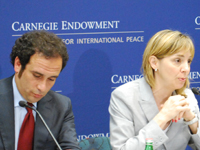Registration
You will receive an email confirming your registration.
With the approach of the 2010 Egyptian parliamentary elections and 2011 presidential election, the opposition has been reinvigorated, especially since the arrival of former IAEA Chief Inspector Mohamed ElBaradei. The Carnegie Middle East Center’s Amr Hamzawy discussed the significance of upcoming elections and challenges facing the Egyptian opposition in the months ahead with Jeremy Sharp of the Congressional Research Service. Carnegie’s Michele Dunne moderated.
The Legal Environment
Hamzawy described the various laws and constitutional articles that will govern the upcoming elections:
- Article 88 of the Egyptian Constitution originally required that election balloting “take place under the supervision of a judicial body.” It was amended in 2007 to remove judicial supervision of elections, replacing it with a semi-independent electoral commission.
- Article 76 of the Egyptian Constitution essentially restricts presidential candidates to political parties registered with, and approved by, the existing government. It sets out extremely difficult conditions for independents to get on the ballot for the presidency.
- Article 77 of the Egyptian Constitution does not contain term limits for the president.
- Emergency Law: Egypt has been under a state of emergency since 1981, and the current government is likely to renew the emergency law soon. As a result:o
- Political entities cannot mobilize or organize rallies.
- Opposition actors can be easily harassed or imprisoned without trial.
Government Tools
The government uses a number of methods in order to maintain political power while engaging in the election process, Hamzawy stated. In particular, the government has undertaken the following policies:
- Rejecting amendments intended to change the restrictive legal environment
- Targeted repression against groups it perceives as particularly threatening
- ”Periodizing” the way Egyptians discuss and approach the three upcoming elections--Shura Council in June 2010, People’s Assembly in November 2010, presidency in autumn 2011—and trying to limit popular discussion to the parliamentary elections for now in order to keep the populace from looking at the elections as a long-term means of comprehensive change
- Influencing established political parties, which have been domesticated by the government and are now dependent on it to secure a share in the parliament to be elected
- Democracy-based rhetoric, which the regime employs domestically and internationally.
Informal opposition
Hamzawy discussed the similarities and differences between the opposition movements before the 2005 elections and the movement currently taking shape in Egypt:
- Platform: The 2004-05 opposition’s platform was a maximalist one, which sought rapid large-scale transformations of Egyptian politics and society. The modern opposition has a similar outlook, structuring its platform around the same essential demands:
- Constitutional amendments
- Presidential succession not based on Mubarak’s son or close confidantes.
- Members: The composition of the current spectrum of opposition is quite similar to that of 2004-5. The opposition is still made up of:
- Informal networks and loose alliances united around one platform.
- Activists uniting across ideological lines.
- Future Planning: While the 2004-5 opposition had a wide-ranging platform, it was not able to translate that platform into an action plan. Similarly, the current Egyptian opposition has not yet formulated an action plan to accomplish its goals.
Muslim Brotherhood
In the 2005 elections, the Muslim Brotherhood was viewed as the leading opposition group, Hamzawy said, but in the current phase the movement appears to be following other opposition groups rather than leading. In the intervening years, the Brotherhood has undergone significant regime repression as well as a leadership change. The Brotherhood will still contest elections (even for the Shura Council, where it has never won a seat) and is attempting to work with other opposition groups and harmonize their demands. Hamzawy believed that the Brothers will take a cautious policy toward ElBaradei, pledging support and criticizing him at the same time.
ElBaradei
The one significant difference between the 2005 elections and the current phase is the presence of ElBaradei, a figure above the fray behind whom many opposition groups can unite:
- Newcomer Advantage: ElBaradei’s long absence from Egypt means that he has not been involved in any of the rampant corruption endemic to the Egyptian political system.
- Gaining Momentum: ElBaradei seems to have reenergized the political scene in Egypt, which has been stagnant for the past few years.
- Working on Policy Positions: Hamzawy observed that ElBaradei has made some ill-advised statements on foreign policy, for example Gaza, which he later retracted. ElBaradei needs to make it clear that he is not easily swayed by those around him when it comes to foreign policy.
- Needs Broader Outreach: Hamzawy also pointed out that ElBaradei’s strongest support so far comes primarily from youth and Egyptian expatriates. ElBaradei needs to reach out to other crucial constituencies, including the military, labor groups, Copts, the business community, and young Muslim Brotherhood members who seem attracted to his cause.
Egypt’s Election and the United States
Jeremy Sharp highlighted the improvement in Egyptian-U.S. governmental relations recently, parallel to an improvement in Egyptian-Israeli relations. This still matters a great deal in how U.S. decision makers, particularly in the Congress, view Egypt. In a discussion after the presentation, Amr Hamzawy responded to a question about what the United States can do to promote free elections in Egypt by noting that Washington should be able to support the demands now emerging from the Egyptian opposition: restoring judicial supervision, domestic and international monitoring, and opening up the presidential election to independent candidates.
